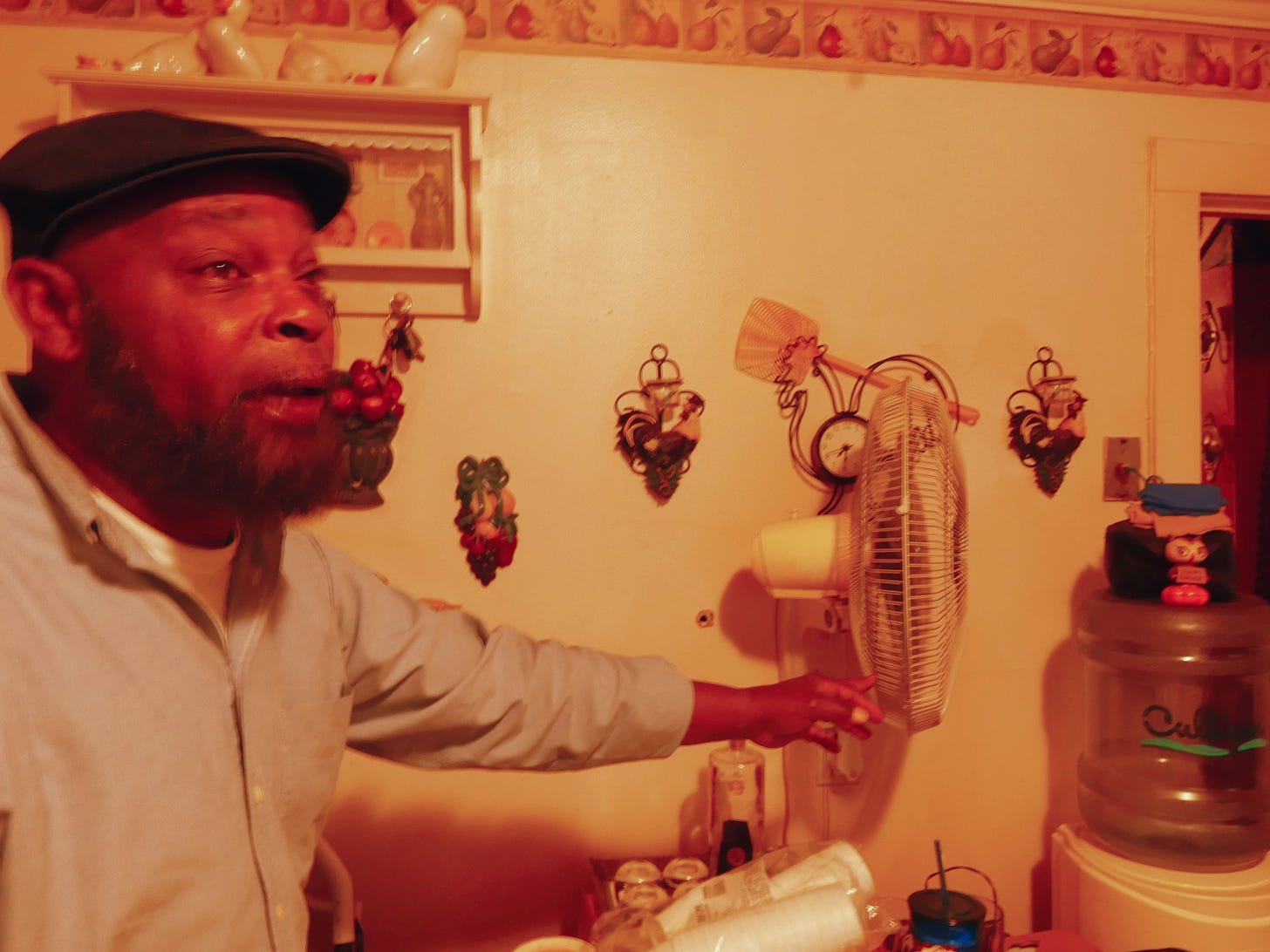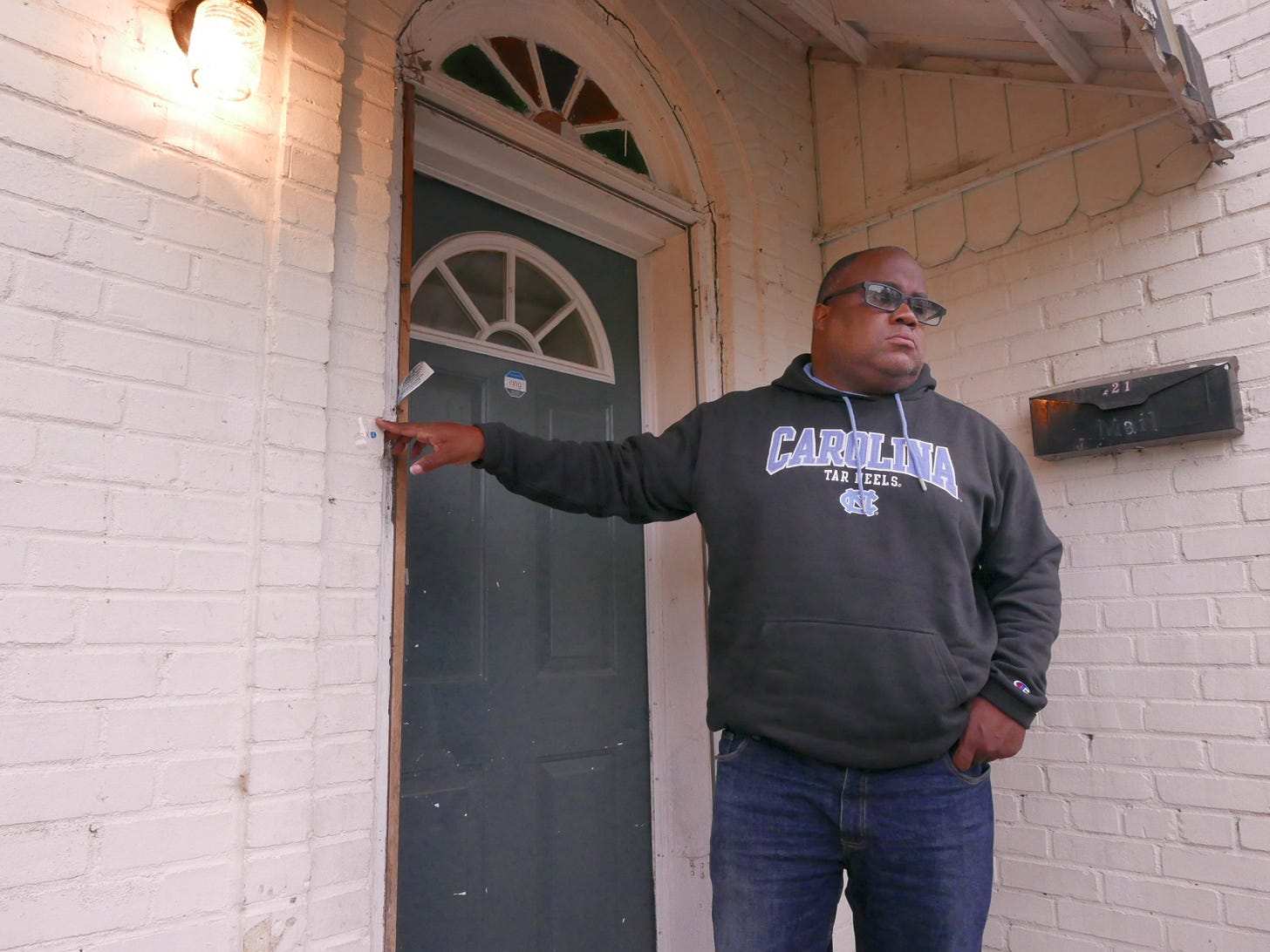Missing Cameras And Mounting Questions After The Shooting Of Andrew Brown Jr.
ELIZABETH CITY, N.C. — Ben Crump, the civil rights lawyer who has become known as “Black America’s attorney general,” is convinced that authorities in coastal Pasquotank County don’t want the world to see footage of Andrew Brown Jr.’s death.
“I don’t think they want to release this video,” Crump said in a conversation with The Uprising on Sunday evening. “I think that once they release this video there is no coming back.”
Crump made his assessment as he visited the home where Brown, 42, was shot and killed by sheriff’s deputies executing a drug-related arrest warrant on the morning of April 21. Brown is set to be laid to rest on Monday afternoon in a funeral ceremony that will be attended by his children, grandchildren, and national civil rights leaders.
Crump, who has represented relatives of multiple Black people killed by the police in recent years and is one of several lawyers representing Brown’s family, believes the growing prevalence of cell phone and surveillance cameras has played a transformative role in generating public outrage about these incidents. After watching an excerpt of the police body camera footage, which has not been made public, Chantel Cherry-Lassiter, another one of the Brown family’s attorneys, told reporters it showed an “execution.” Cherry-Lassiter claimed Brown “wasn’t reaching for anything,” had his hands on the steering wheel, and was trying to drive away from the deputies.
Crump and Brown’s legal team want the world to see footage of his death.
“This is from a man who’s going away from them, who hasn’t brought any violence to them,” Crump said. “They were shooting recklessly, but until you come and see it for yourself, you can’t quite understand the level of recklessness.”
Brown’s home on Perry Street still bears the scars of that day. The grass yard is marred by tire tracks marking what witnesses have said was Brown’s failed attempt to drive away as the deputies opened fire. Brown’s car crashed into a crepe myrtle tree in the front yard of his neighbor, Michael Gordon. The tree is still studded with bits of automotive glass and plastic. According to Gordon, one of the bullets also cut through his home.
Gordon took Crump and The Uprising into his house on Sunday to show the damage. A deep groove was visible on the awning over his front porch where he said the bullet first hit. That path led straight through a hole in the wall that opened into Gordon’s living room, inches above the headrest of a chair where he said his wife “sits all the time.” Gordon said the bullet continued traveling and pierced the wall of his kitchen, passing over a small dining room table and smashing into a crock pot that was sitting on a counter. A deep dent was visible in the pot, which sat next to a large picture of former President Obama. Gordon pointed to the dining room table just below the bullet hole and said he is grateful his grandchildren were not visiting that morning.
“That’s where my grandkids eat when they stay with papa and grandma,” he said.
As he walked Crump out of his home, Gordon offered his take on the shooting.
“I believe they came down to kill the man,” Gordon said of the deputies.
Gordon said his opinion was, in part, based on the fact officials have not released the video.
“If that man had come out of his home shooting and firing, then that video would be released on the 12 o’clock news,” Gordon said.
“Immediately,” Crump concurred, repeating himself for emphasis. “Immediately.”
On Gordon’s porch, Harry Daniels, another one of the family’s attorneys pointed back to Brown’s house across the street. Daniels said the legal team analyzed the trajectory of the bullet holes in Gordon’s house and determined they showed Brown was shot from behind.
“We put the laser all the way back. we kind of got the stance where that officer was shooting,” Daniels said. “They clearly were behind him … they were spraying.”
Brown’s family and their attorneys conducted an independent autopsy that concluded he was shot five times, including once in the back of the head.
Pasquotank Sheriff Tommy Wooten did not respond to a detailed list of questions about the case from The Uprising. Instead, a spokesperson for Wooten provided a link to a website posted by the county sheriff’s office to address what it describes as “false internet rumor.” The site disputes the claim Brown’s killing was an “execution.”
“This is unproven hyperbole that only inflames the community and — should this matter ever go to court — could bias potential jurors and perhaps interfere with a fair trial for anyone involved,” the sheriff’s site said. “We want answers as much as the public does but have to wait for the independent investigations to progress.”
The public might be able to see the incident for themselves since it was captured by police body and dashboard cameras.
However, on April 28, a judge delayed the release of that footage for at least a month at the request of the local prosecutor, Pasquotank District Attorney Andrew Womble. That ruling came in spite of the fact a coalition of media groups requested the footage be made public. Even as he blocked release of the video, the judge, Jeffrey Foster, said revealing it would “advance a compelling public interest.” Wooten, the county sheriff, has also said the footage should be released.
And the cameras carried by Wooten’s deputies might not be only ones that filmed Brown’s death.
Elizabeth City police provided a local media outlet with surveillance videos that showed the sheriff’s deputies, who are county officials, driving up to Brown’s home in tactical gear and charging across his lawn. The cameras, which were down the street from the house, did not capture footage of Brown or the shooting itself.
But there may be other videos of the incident. Brown’s home was owned by a man named Andre Simpson, who said the front door was outfitted with a pair of Ring doorbell cameras. Now, there are only scuff marks on the wood.
“Someone took them,” Simpson said of the Ring cameras.
The shooting is currently being investigated by the FBI and the North Carolina State Bureau of Investigation. The Uprising reached out to Womble, the local police chief, the county sheriff, and the FBI to see if they were in possession of the Ring cameras. Spokespeople for the FBI and the State Bureau of Investigation declined to comment due to the ongoing investigations. The other officials did not respond.
According to the legal team representing Brown’s family, the State Bureau of Investigation reached out to Ring to see if the company stored any of the footage. Ring did not immediately respond to requests for comment about whether they are cooperating with officials or the lawyers for Brown’s family.
Along with pressing for the videos to be released, the Brown family’s legal team wants to see a special prosecutor take over the case from Womble, the local county D.A. One of the family’s attorneys, Bakari Sellers, told The Uprising he has “an inherent bias against district attorneys and prosecutors prosecuting police officers from their own district where they do work.”
“It's an incestuous relationship,” Sellers said. “They work with these individuals day in and day out to build cases. … They rely on their work.”
North Carolina Gov. Roy Cooper has also called for a special prosecutor to take the case. However, Cooper also said the law only allows this if Womble, the county prosecutor, requests assistance from the governor’s office. Cooper said Womble “acknowledged” the offer to appoint a special prosecutor, but has not requested one. Womble did not respond to requests for comment.
Along with the concerns about the withheld video footage and the prosecutor, Sellers said Brown’s family and their attorneys have questions about the level of force the sheriff’s deputies brought to bear when they tried to make the arrest. Sellers emphasized the fact Brown’s home is around the corner from an elementary school.
“It was eight o’clock in the morning, they shot into somebody else’s house, and school kids walk up and down that street,” Sellers said.
Sellers said Brown was involved in drug dealing, but “there were no drugs found and no weapons found” at the scene of the shooting.
“That's not a death penalty crime,” Sellers said. “You can't go from warrant to death already in the United States last time I checked.”.
The deputies were part of a heavily armed, SWAT-style tactical unit. According to the county sheriff’s “fact check” website, the unit was used because,“the deputies who were serving the lawful search warrant and the lawful arrest warrant knew Mr. Brown was a convicted felon” who “has been arrested previously on multiple occasions for resisting arrest.”
Protesters have taken to the streets of Elizabeth City to call for the release of the video and for the appointment of a special prosecutor every evening since his death. Officials in the city, where just over half the population is Black, have issued a state of emergency and implemented a curfew in light of the demonstrations, which, thus far, have remained largely peaceful.
Mourners and neighbors who gathered in front of a mural and makeshift memorial outside Brown’s home said they were shocked and saddened by the killing. Demetria Williams, a neighbor who said she witnessed the shooting, offered a blunt and pained account of the deputies’ conduct on that fateful day.
“You know how people hunt for game?” she asked, adding, “That’s how they came in.”
—
Want to read more stories like this one? Sign up for The Uprising, a new, unconventional, and fully independent morning politics newsletter.







Something is really fishy in Elizabeth City.